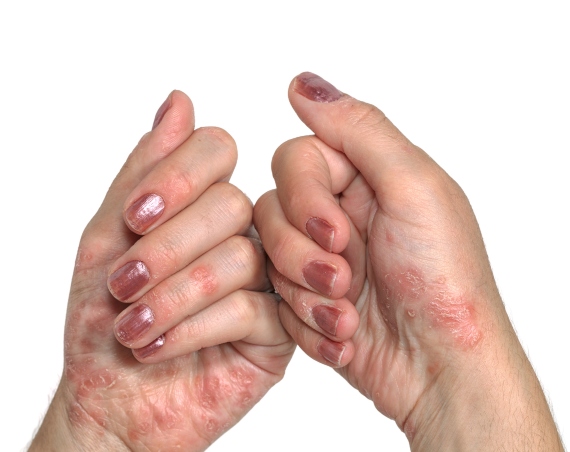There is a lot more going on under the surface of this skin disease beside the obvious symptoms. What you can see is only part of the story. With normal skin, your body takes 28-30 days to produce new skin cells and shed the old ones.

While those who have psoriasis produce new skin cells in a few days, they also keep their old cells rather than shedding them. Psoriasis turns your skin cells into type A overachievers. They grow about five times faster than normal skin cells and your body can’t keep up.
The old dead skin cells pile up on top of each other instead of sloughing off. As more and more skin cells are produced rapidly, the old skin cells are pushed to the surface, forming thick, red, itchy, dry patches.
They usually appear on the elbows, knees, scalp, lower back, face, palms and soles of feet. Areas that are harder to notice are the fingernails, toenails and mouth.
Not Contagious
Psoriasis is a genetic autoimmune disease, it is not contagious, which means you can not get it from touching someone who has it. Because psoriasis tends to be a life-long disease, it’s best to seek treatment by a dermatologist.
You are better equipped to gain control of it by learning its triggers. The intensity of it can be worsened by stress, illness and alcohol.
This condition can affect any area of skin including the mouth and may cause cracks and white or red patches on the tongue. Oral lesions are typically rare, but in some cases if you’ve not been diagnosed with psoriasis yet and notice patchy lesions on the lips, this can be a first sign.
5 Different Types of Psoriasis
– Plaque Psoriasis: This is the most common type most people think of when they hear the term psoriasis. It’s characterized by scaly patches of skin mentioned previously. These can often be itchy and may even crack and bleed.
– Guttate: Presents with small round lesions. This form usually presents in childhood and may even be triggered by a strep infection, which are common among children.
– Inverse: This form presents as shiny lesions usually in skin folds, behind knees in the under arms, etc. Inverse psoriasis is often found in combination with other types of the disease.
– Pustular: Typically affecting the hands and feet, this form presents like you’d expect, with white pustules. Although it may look like an infection, it is not. The pustules are filled with white blood cells as a result of the immune response.
– Erythrodermic: Although rare, this form of psoriasis is particularly severe. It presents as an extreme redness all over the body. It can cause the skin to peel and is usually itchy and painful. This form of psoriasis can be life threatening and you should see a doctor immediately if it appears. Erythrodermic psoriasis is often found in individuals with uncontrolled plaque psoriasis.

Moderate to Severe Periodontitis
There is a lot of research that still needs to be done to determine how exactly this particular disease affects oral health other than its manifestation. In a study from Norway, it was found that 24% of participants with psoriasis had moderate to severe periodontitis.
In contrast, only 10% of the control group without psoriasis suffered from moderate to severe periodontal disease. At the end of the study, the assumption is made that the link between the two diseases is likely involved in the immune response. No definitive link has been found, so more research is needed to further understand what if any impact periodontal disease and psoriasis have on each other.
Psoriasis and Periodontal Disease
These different forms of psoriasis can all be very hard to deal with. It is our hope that further understanding will arise as research continues. If a link is found between psoriasis and periodontal disease, we will strive to provide treatment that can ease the symptoms of both diseases if possible.
In the meantime, if you suffer from psoriasis or any autoimmune disease it seems that good oral health can often improve symptoms. At Safe Harbor Smiles, it is our goal to treat patients with the best care possible, and that means looking at how we can improve other diseases you may suffer from. Good oral health is good for overall health! If you suffer from psoriasis and would like to discuss how we can further improve your oral health, we can talk it over at your next visit.
References

Experience exceptional dental care at Safe Harbor Smiles, where our dedicated team prioritizes your comfort and health while crafting personalized treatment plans tailored to your family’s needs.
